Business
A Russian exile won $200 million from a Putin crony. He could lose it all in U.S. courts

Two decades ago, Ashot Yegiazaryan, a wealthy businessman and Russian politician, partnered with Moscow officials to rebuild the aging Hotel Moskva, a Soviet landmark whose striking facade adorns the label of Stolichnaya vodka.
But Yegiazaryan didn’t stick around for the ribbon cutting. He fled the country in 2010, alleging he had been squeezed out of the project by prominent oligarchs closely allied with Vladimir Putin, according to a 2014 filing in federal court in Los Angeles.
The exiled politician sought refuge in a hilltop home in Beverly Hills, from where he managed to extract a nearly $200-million settlement from a U.S.-sanctioned Russian billionaire over the busted deal.
But in a seemingly unrelated dispute, he lost an $84-million arbitration award to a former business partner, who claimed Yegiazaryan had swindled him, and was convicted in absentia of criminal fraud in Russia.
The Stalin-era landmark Hotel Moskva in 2003, covered by advertising posters. It was later demolished to make way for a Four Seasons Hotel.
(Alexander Zemlianichenko / Associated Press)
Today, he stands increasingly hemmed in, legally and financially. Long the subject of an Interpol Red Notice, he has faced arrest if he traveled abroad and recently faced a similar threat in his adoptive home. After years of maneuvers to avoid paying the judgment, he was held in contempt in May by a federal judge in Los Angeles who warned he might incarcerate Yegiazaryan.
Last month, the U.S. Supreme Court ruled that a separate lawsuit filed by his former partner, Vitaly Smagin, under the Racketeer Influenced and Corrupt Organizations Act could proceed. The law, better known as the RICO Act, allows for treble damages that could total more than $300 million in Yegiazaryan’s case.
The lawsuit called Yegiazaryan lord of a “criminal empire” that defrauded Smagin of his interest in a Moscow mall and has prevented him from collecting on his arbitration award. RICO has long been employed in civil litigation, but under what circumstances it can be applied to foreign disputes has been unclear.
Yegiazaryan has maintained that he is the subject of a “witch hunt” conducted by his adversaries in the Putin government, with whom Smagin has collaborated, according to a 2015 federal court filing in Los Angeles opposing a worldwide freeze of his assets.
Yegiazaryan’s lengthy legal battle has been followed by a small circle of Putin’s critics, who see courts in the West being used to harass dissidents even as the war rages in Ukraine.
“They are going after his money and the Western courts and law enforcement systems are completely naive,” said economist Anders Aslund, who served as a Swedish diplomat in Moscow and has written about the conflict for the Atlantic Council, a Washington, D.C., think tank.
Smagin declined to be interviewed, according to his lead attorney, Nicholas Kennedy, who said in a statement that the claim his client “is affiliated with the Russian government in any way is absolutely false and has been rejected repeatedly by courts around the world.”
Diego Zambrano, an associate professor at Stanford Law School, cited Yegiazaryan’s legal battle in a recent scholarly article as part of a trend in which authoritarian governments make use of Western courts to harass political dissidents, critics and even the U.S. media. Yegiazaryan quoted the article in an appeal last month of the recent contempt order.
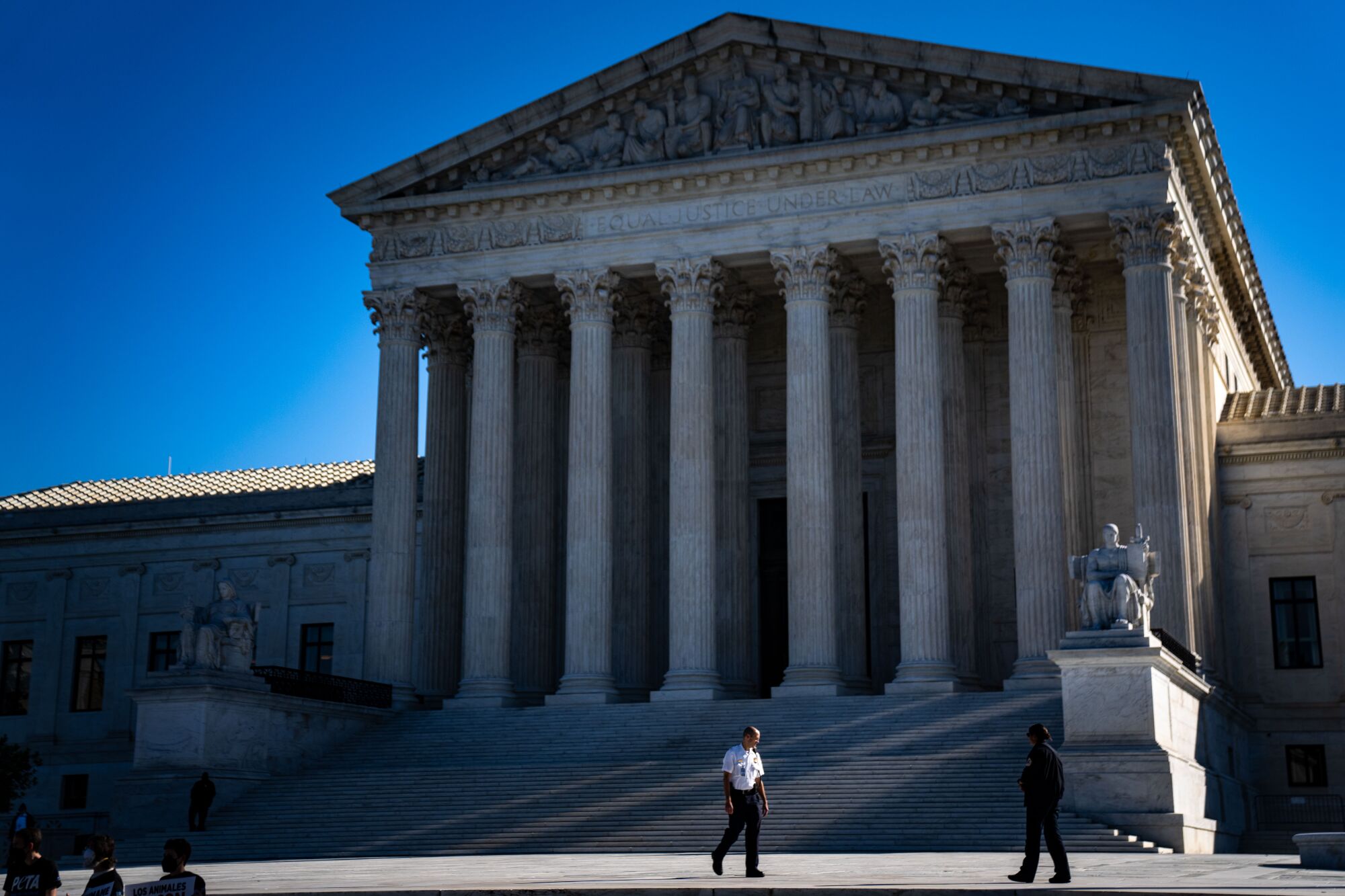
The U.S. Supreme Court ruled that a lawsuit filed under the RICO Act by Ashot Yegiazaryan’s former partner in a Russian deal could proceed.
(Kent Nishimura / Los Angeles Times)
“This lawsuit has reflected a clear attempt by ‘Russia’s authoritarian government’ to use a ‘proxy plaintiff’ — Smagin — ‘to file claims in U.S. court against [a] dissident and exiled politician,’” the appeal stated, quoting Zambrano.
Kennedy, a partner at Baker McKenzie — a leading U.S. law firm that had a large Russian practice before spinning it off after the country’s invasion of Ukraine — said Yegiazaryan’s claims have been discounted by judiciaries worldwide.
“The courts in the U.S., U.K., Liechtenstein, Nevis and Russia … have considered over a period of many years the body of evidence relating to Mr. Yegiazaryan’s conduct directed to Mr. Smagin and others, and spoken loudly, consistently and definitively in condemning that conduct,” said Kennedy, who declined to answer a lengthy set of questions about the dispute and instead referred The Times to court filings.
After a court battle that has been fought over a decade in no fewer than seven countries, both Yegiazaryan and his former partner have spent huge sums that have drained them.
Smagin is in bankruptcy in Moscow, while Yegiazaryan said he is living on borrowed money after he and his family laid out an estimated $50 million for lawyers. He wrote up his own legal briefs after the RICO case was filed before finding money for a lawyer with experience before the Supreme Court.
However, his former wife alleges he actually has hundreds of millions of dollars of assets at his disposal held in the names of others, including the Beverly Hills home, a villa in France and properties in Russia. He denies the claims, which are being litigated in divorce proceedings in Los Angeles and Russia.
Yegiazaryan applied for permanent political asylum when he arrived in the U.S. Neither he nor the U.S. government would comment on the status of his application, but a Russian newspaper reported that an extradition request was turned down years ago.
Were he to return to Russia, Yegiazaryan would face imprisonment for seven years — and fears worse.
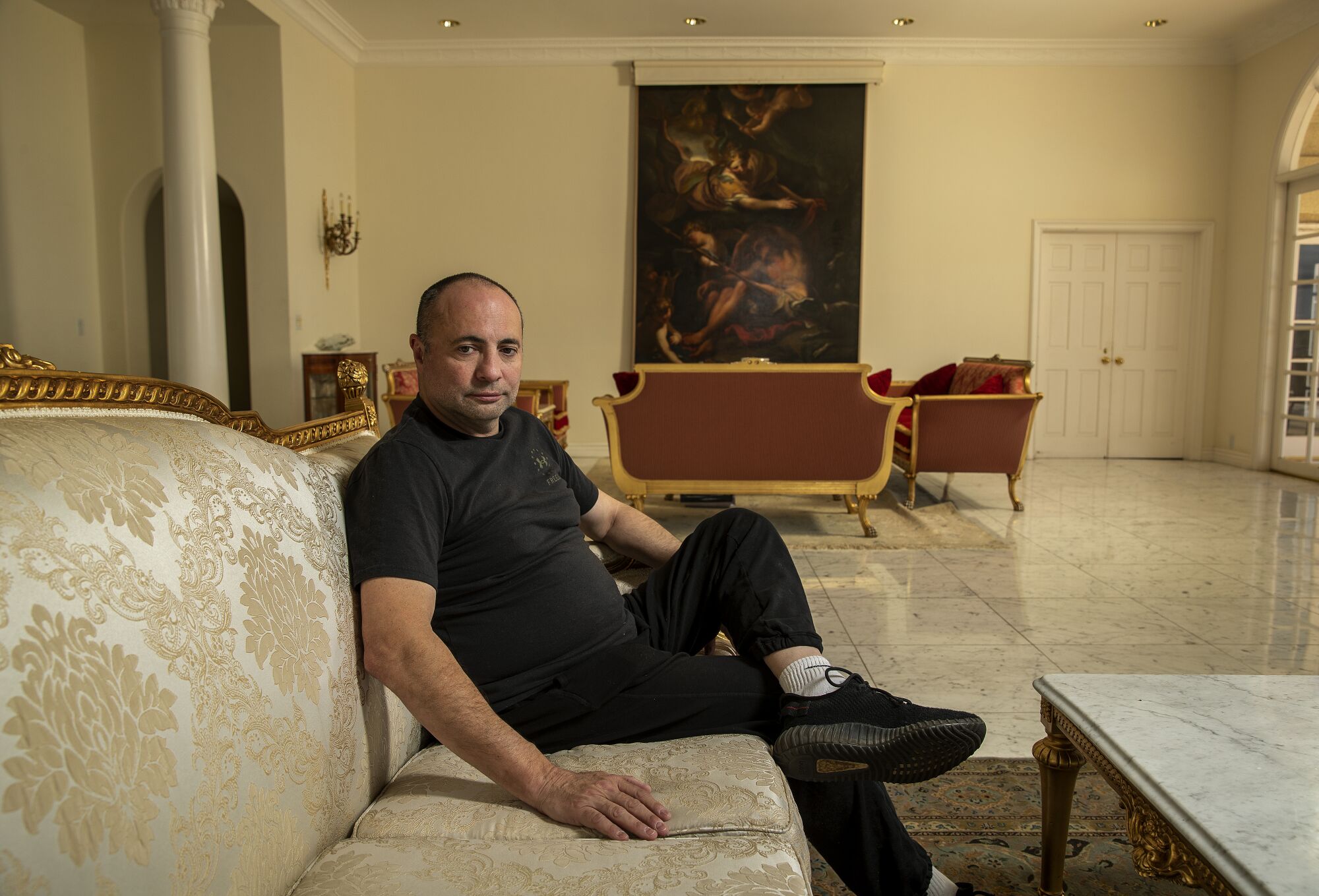
Exiled Russian businessman and former Duma member Ashot Yegiazaryan at home in Beverly Hills.
(Mel Melcon / Los Angeles Times)
He has long asserted that his cousin’s husband, an executive for the state-controlled Gazprom energy company, was shot in the head and killed in 2010 after refusing to participate in a smear campaign against him.
“They would kill me. Putin is now using the United States to advance his interests,” he said.
The wild ‘90s
It’s a mild winter day and Yegiazaryan has picked a patio table at a favorite Pacific Palisades restaurant. Dark stubble on his worn face, the 58-year-old is dressed in gym apparel and Crocs.
Recounting his saga through an interpreter, he calls to mind the title character in Woody Allen’s “Zelig,” repeatedly turning up in different guises at critical points in contemporary Russian history.
His late father, Gevork Yegiazaryan, led the industrial economics department at prestigious Moscow State University. The younger Yegiazaryan got a doctorate in finance with an eye toward business. And there might not have been a better time to make money than 1990s Moscow, as Russia shed its communist ideology, privatized state industries and made a chaotic transition to capitalism.
After a stint as chief executive of a Moscow regional development fund, in 1993, he joined Moscow National Bank and rose to president and chairman of the board. “I knew everyone,” he boasts.
The bank eventually failed amid a financial scandal, like others in Russia’s burgeoning bank sector, which was hard hit by a 1998 government bond default. Yegiazaryan denies any wrongdoing.
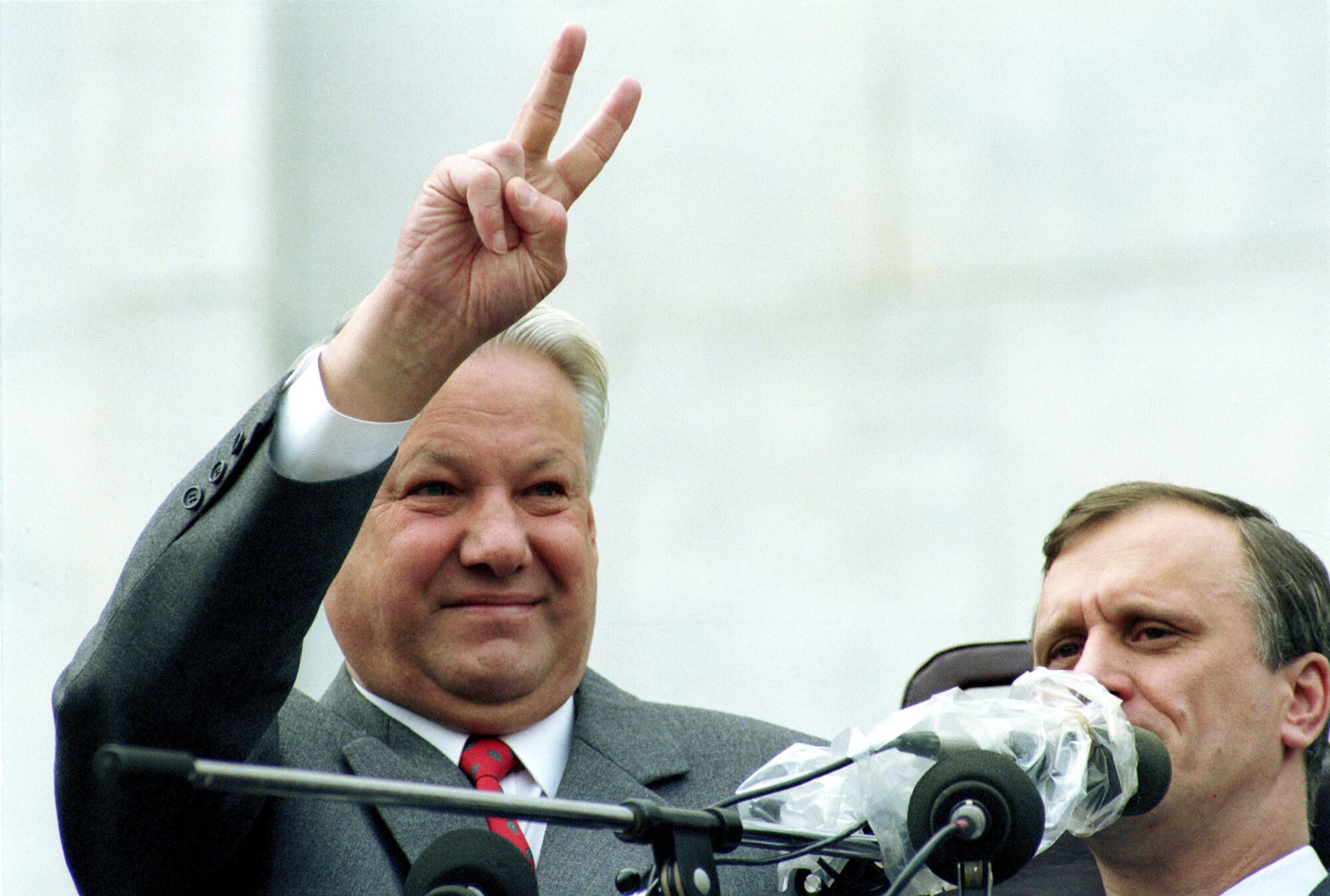
Russian President Boris Yeltsin gestures to thousands of Muscovites during a rally in 1991.
(Boris Yurchenko / Associated Press)
His banking career ended, his ambitions turned to media and politics. He became what he terms the “unofficial accountant” of Boris Yeltsin’s 1996 successful reelection campaign for president, which was in trouble amid high unemployment, rampant inflation and rising inequality.
After the collapse of the Russian economy in 1998, with the oligarchs under attack for their sudden wealth from the privatization of state assets, Yegiazaryan became an aide to a Communist member of Yeltsin’s Cabinet. In 1999, he became a Duma deputy for the Liberal Democratic Party of Russia.
Yegiazaryan said he didn’t support the party’s ultranationalist leader but ran at the direction of Putin, then prime minister, who wanted allies sprinkled across the political spectrum.
But even as his star was rising in the Federal Assembly, Yegiazaryan was pursuing a real estate career he had started in the early 1990s.
What has happened since Putin’s third term is that the truly evil businessmen have eliminated everyone else with any scruples.
— Richard Hainsworth, former Moscow-based banking analyst
Yegiazaryan said he bought the land for the mall in the mid-1990s and put in the name of several Moscow National Bank employees, including Smagin, as a way of protecting himself against possible raids on his assets by politically connected business rivals — a not uncommon practice in Russia.
He said Smagin was given a 20% share of the project to shepherd it through Moscow’s Byzantine approval process. But at the Russian criminal trial, Smagin testified he met Yegiazaryan years later and, needing financing, brought him into the project, according to a copy of the proceedings filed in the RICO case.
Whatever the circumstances of their meeting, the Moskva project was a big step up.
By the time Yury Luzhkov was appointed mayor in 1992, the Stalin-era Hotel Moskva was crumbling. Luzhkov saw the landmark, near the Kremlin and Red Square, as crucial to a decades-long redevelopment plan that would transform the city into today’s modern metropolis.
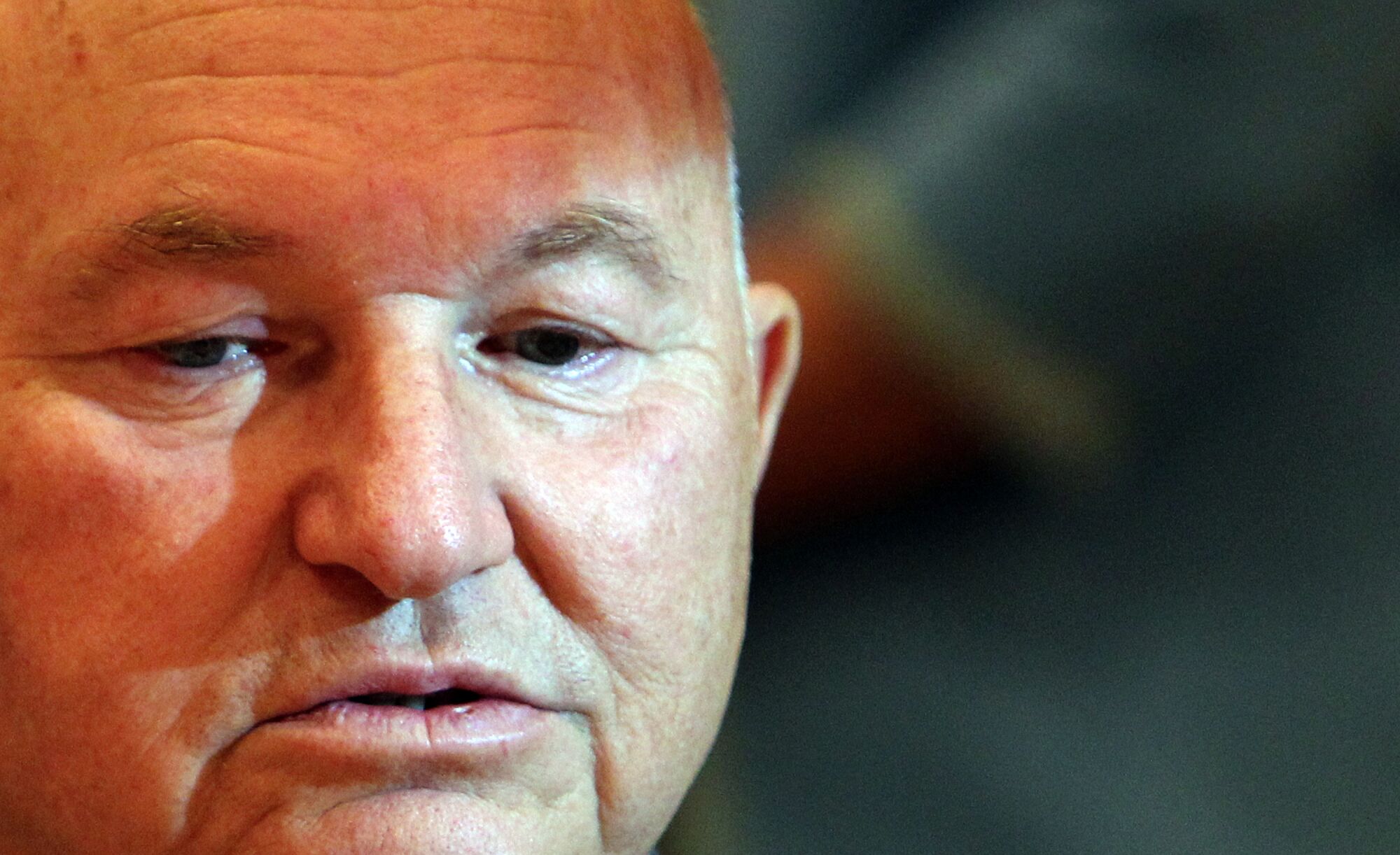
Former Moscow Mayor Yury Luzhkov.
(Alexey Sazonov / AFP via Getty Images)
Donald Trump, who had been scouting Moscow for his first international development, had a tentative deal in 1997 to modernize the hotel. The $200-million project never got off the ground, according to news reports at the time. (The Trump Organization did not respond to emails for comment.) But Luzhkov quickly found another private sector partner to build an entirely new hotel — Yegiazaryan.
The Duma member had an in — his father was a close friend of the prior mayor. Yegiazaryan also brought lots of money, raising and contributing more than $250 million and arranging nearly $800 million in Deutsche Bank financing, according to a 2011 federal defamation action he filed in New York over what he claimed was a smear campaign to have him deported.
Demolition work started in 2003 and by 2008 the development was nearing completion — but Yegiazaryan was finding his political standing getting more unstable with each pour of the concrete.
Yegiazaryan said at first he had a good relationship with Putin, who was appointed a Kremlin deputy in 1996. But after Putin became president in 2000, Yegiazaryan found it hard to do business outside the ruler’s close circle of associates — a dynamic reflected in the city hotel deal.
The original tender called for the city’s private partner to control 51% of the joint venture, but according to Yegiazaryan and a court declaration filed by his brother, Artem, he had to split his share with two members of Putin’s inner circle: a man known to be the Russian leader’s massage therapist as well as Arkady Rotenberg, a childhood friend of Putin’s who would become a billionaire and was later sanctioned by the U.S. That left Yegiazaryan with 25.5% of the project.
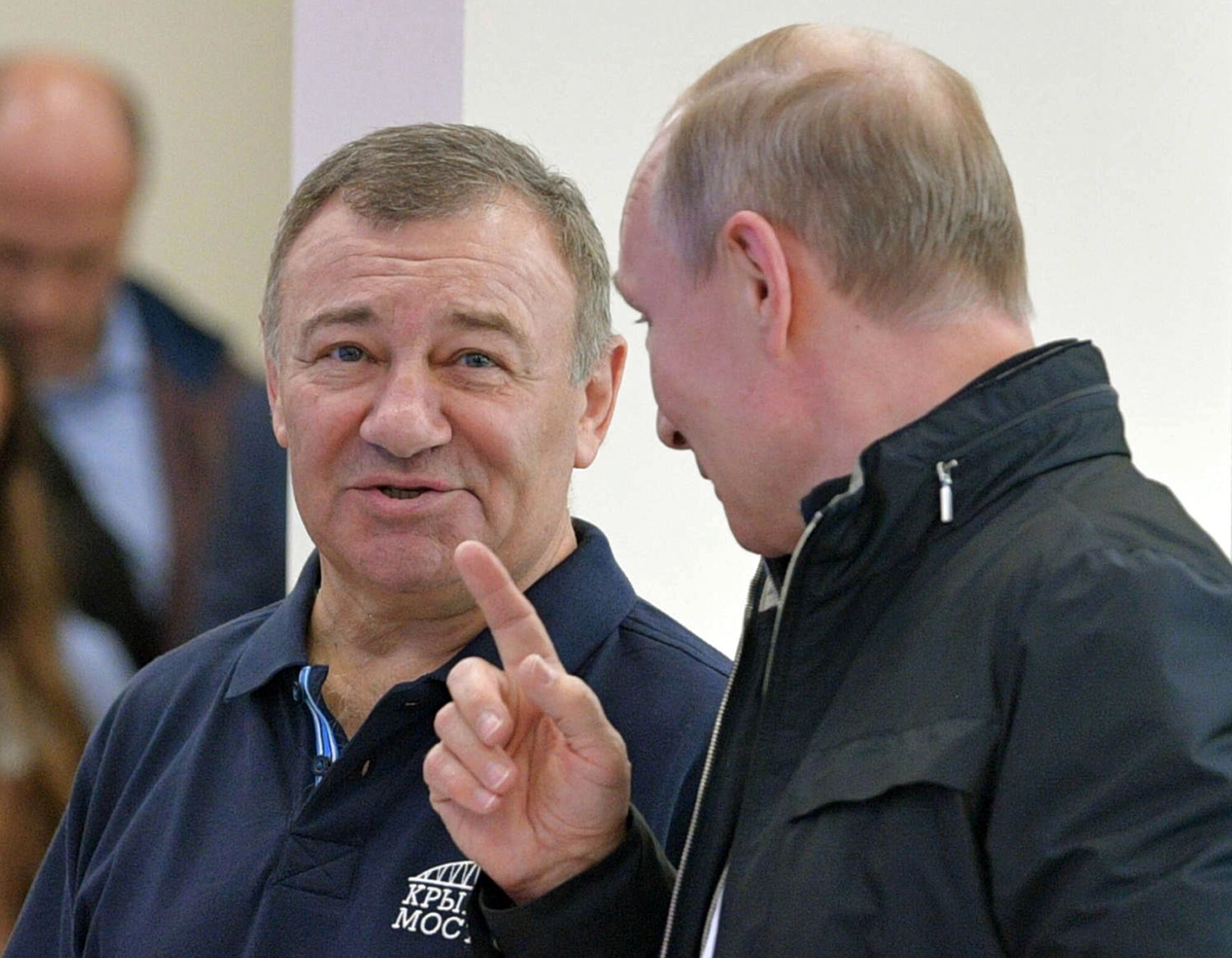
Russian President Vladimir Putin, right, speaks to billionaire Arkady Rotenberg in 2018. Their friendship goes back to childhood.
(Alexei Druzhinin / Associated Press)
A spokeswoman for Rotenberg did not respond to emails for comment.
Disillusioned with the Russian ruler, Yegiazaryan said he decided to bankroll the presidential ambitions of Mikhail Kasyanov, Putin’s first prime minister. Kasyanov, who had been dismissed by Putin in 2004, never made the ballot. Russia’s Central Election Commission claimed he forged signatures for his 2008 bid.
The former prime minister fled Russia months after the invasion of Ukraine and said in a television interview last year he was concerned about his personal safety.
Kasyanov did not respond to multiple emails, but The Times reviewed a letter Yegiazaryan said was written in support of his asylum application in which Kasyanov stated the exiled politician would be convicted in a “show trial” if he were deported back to Russia.
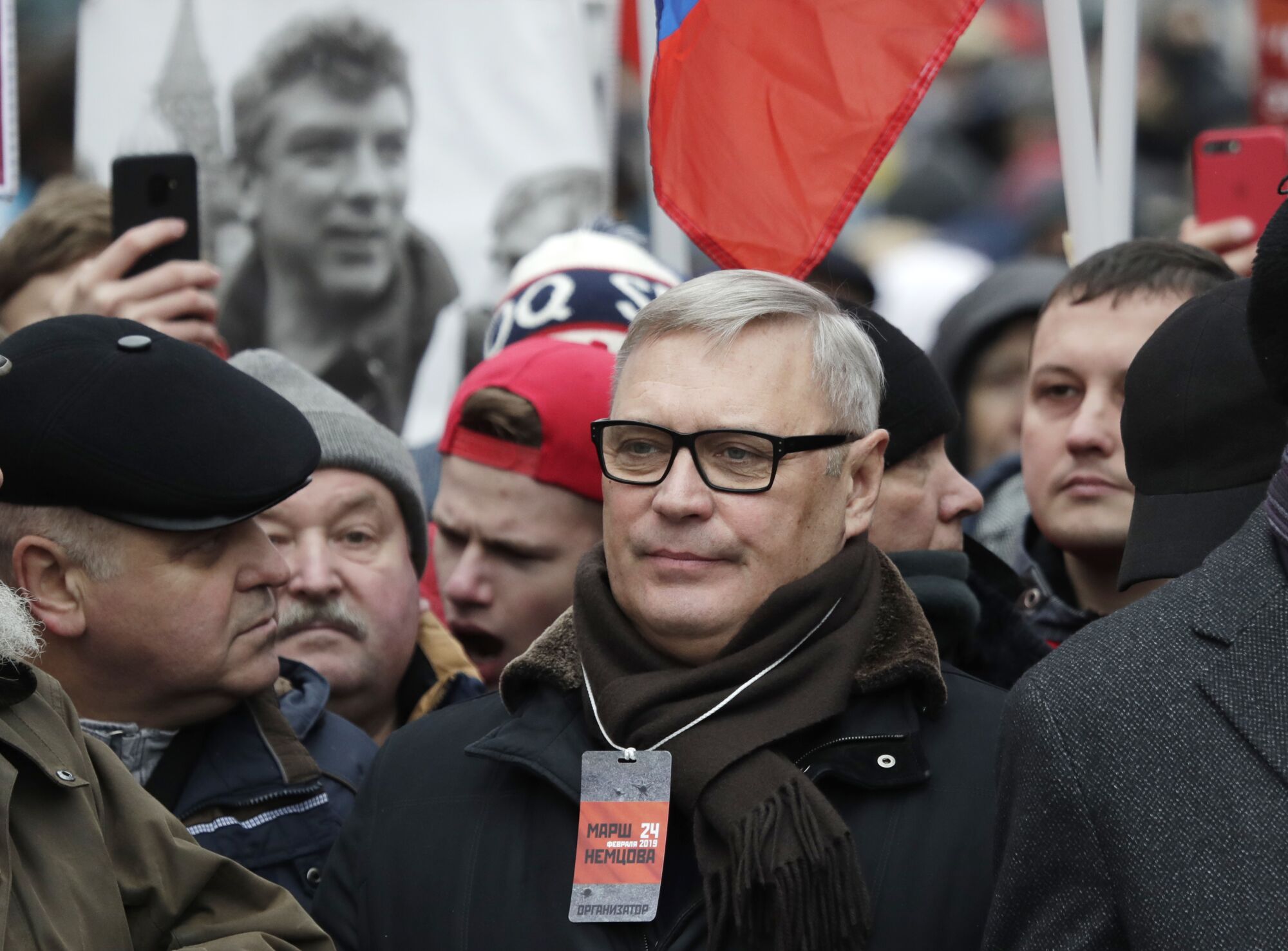
Mikhail Kasyanov sought to challenge Putin for the presidency in 2008. Ashot Yegiazaryan said he provided financial support in the failed attempt.
(Pavel Golovkin / Associated Press)
Yegiazaryan said the move cost him dearly — “We went to war against Putin and we lost.”
Less than a year after the 2008 election, there were rumblings in the Russian media about issues with the Moskva hotel project. A report said the city was offering a controlling stake to Suleyman Kerimov, an oligarch who had made billions in banking, commodities and gold. A member of Russia’s upper house, Kerimov has been sanctioned twice by the U.S., in 2018 and last year, for his role in the government after the invasion of Crimea and Ukraine, among other issues.
Russian federal investigators later announced they had conducted searches related to the “misappropriation” of more than $87 million in the hotel financing as part of a criminal probe. In October 2010, reports circulated that Yegiazaryan had fled the country after not returning from a Duma recess.
Wild West capitalism
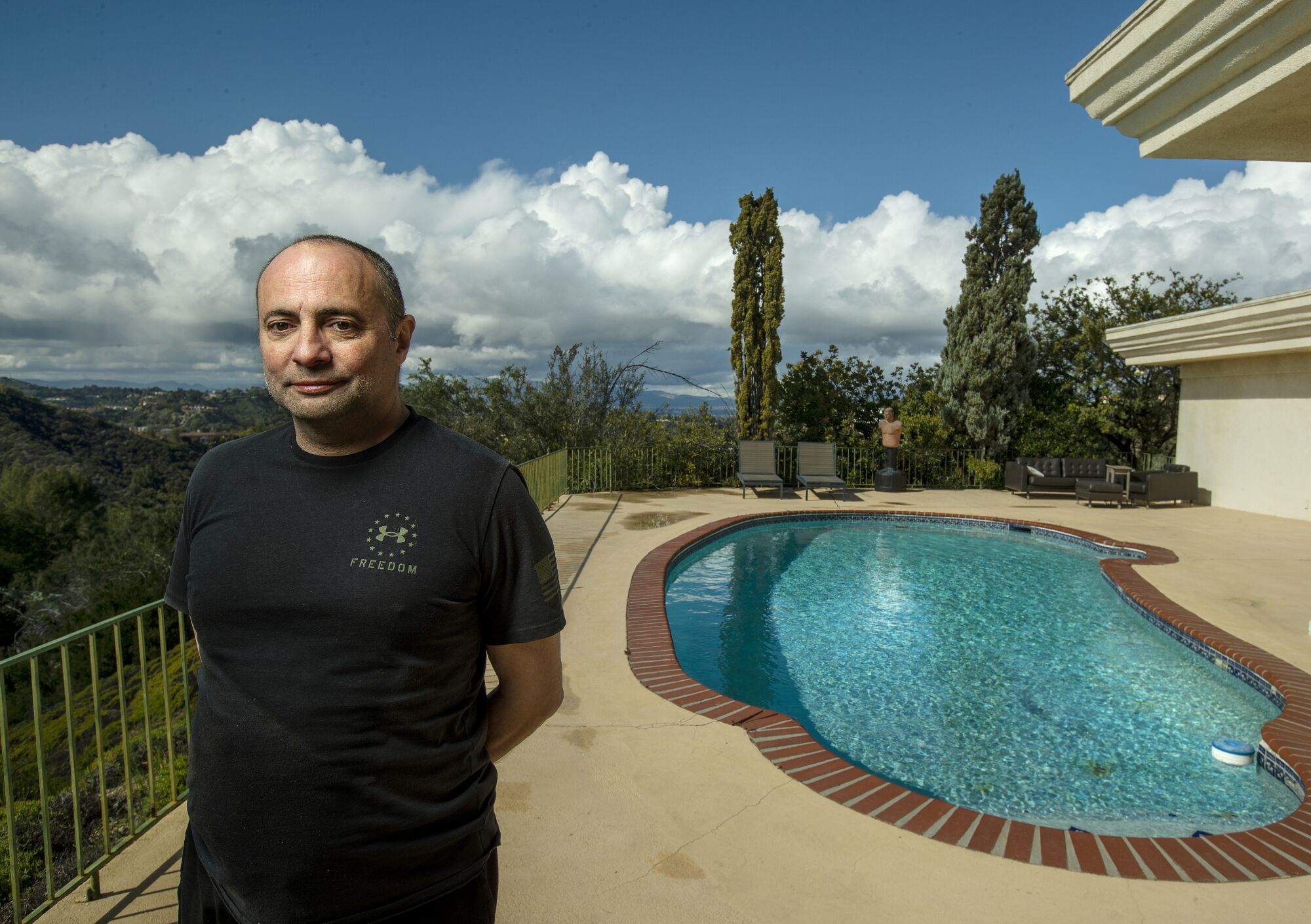
Ashot Yegiazaryan says that if he were to return to Russia, “they would kill me. Putin is now using the United States to advance his interests.”
(Mel Melcon / Los Angeles Times)
Yegiazaryan surfaced in the U.S., where he had moved into a 6,300-square-foot, hilltop home in Beverly Hills now valued at $10 million.
He alleged that he had been forced to turn over his stake in the hotel development to Kerimov after an intimidation campaign that included raids by masked police armed with automatic weapons at his office building and other places, as well as threats to behead his children, according to the 2011 defamation complaint and the 2015 filing seeking to block the asset freeze.
“I was told to stay away from the hotel,” Yegiazaryan said.
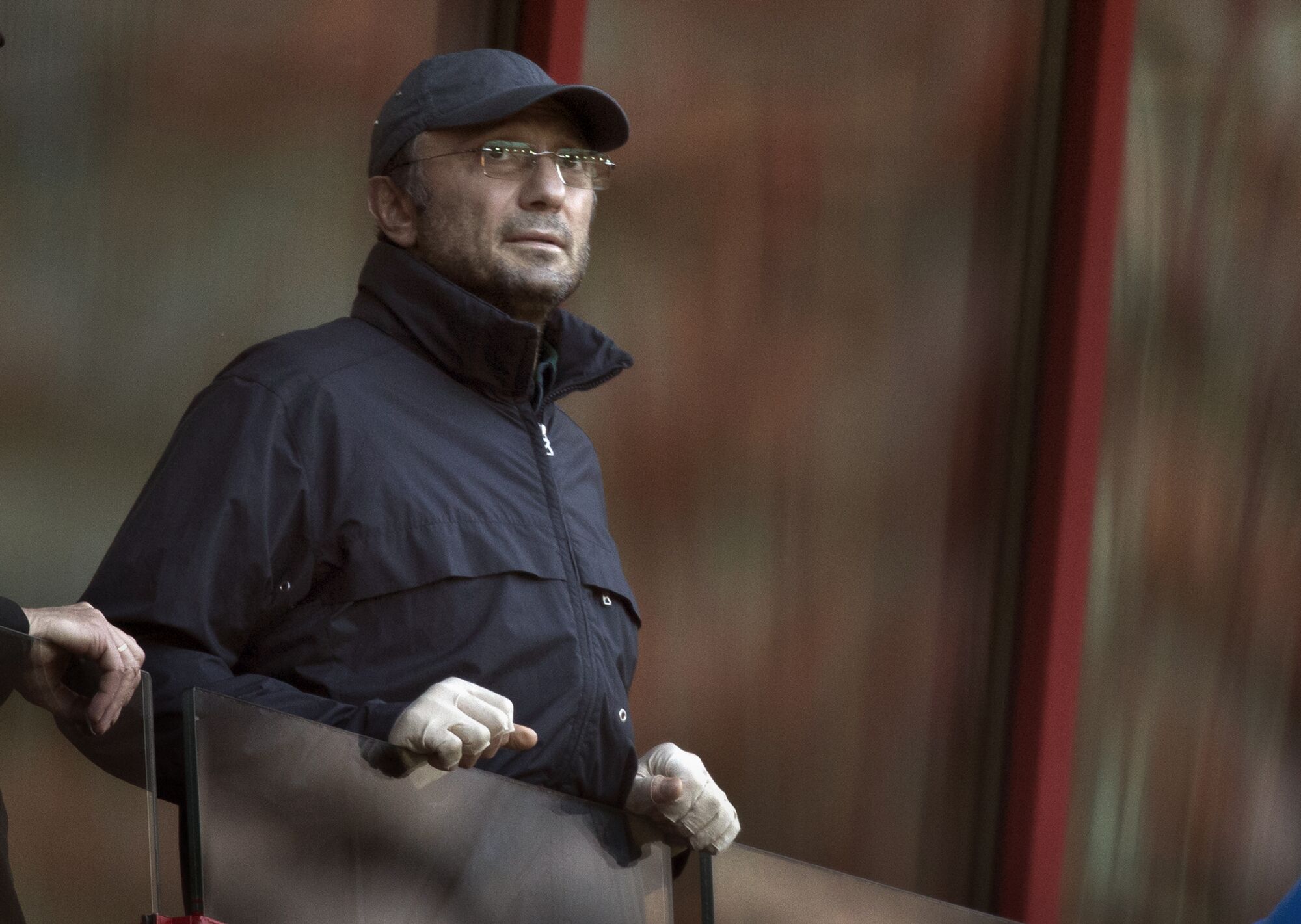
Russian billionaire Suleyman Kerimov. Ashot Yegiazaryan sued him and in arbitration won a $198-million settlement — money that Vitaly Smagin says can satisfy his judgment.
(Alexander Zemlianichenko / Associated Press)
An attorney for Kerimov declined any comment. However, at the time another of his attorneys called the allegations “total fabrications.”
In Russia’s Wild West capitalism, there’s a term for what Yegiazaryan claimed happened: a reiderstvo, translated as a corporate raid or asset grab.
His brother, in response to the RICO suit, filed an affidavit suggesting the move against the hotel was inspired by Moscow’s mushrooming property market, which made a project once slated to cost $300 million worth far more.
Aslund, the author of multiple books on modern Russia, has another take: “Putin wanted somebody who was really close to him to manage the Hotel Moskva, just beside the Kremlin” — a definition that didn’t fit Yegiazaryan.
From his base in Beverly Hills, Yegiazaryan fought back in the fall of 2010, filing a lawsuit in Cyprus — a business haven for Russians — against Kerimov, Rotenberg, Luzhkov and others. He also filed a claim in the London Court of International Arbitration, a respected forum for complex commercial disputes.
But Smagin, his partner in the mall, called Europark, had already filed a criminal complaint in Russia and later his own action at the London arbitration court, claiming Yegiazaryan had pulled a reiderstvo on him.
‘An intricate plot’
One of Moscow’s first Western-style malls when it opened in 2005, Europark would prove instrumental for Yegiazaryan’s Moskva plans.
When Yegiazaryan was raising money for the hotel, he tapped the mall as collateral for a $100-million Deutsche Bank construction loan. The bank decided to sell the loan after the financial crisis, leading to the dispute with Smagin.
Yegiazaryan claims the real origin of the dispute lay in the efforts to force him out of the hotel project. His brother points to a purported 2008 internal Moscow city document signed by the mayor and submitted by Artem in the RICO case record. It discusses ways to force Yegiazaryan out of the hotel project, including by causing complications for the mall and causing the $100-million loan to go into default.
However, in his October 2010 London claim, Smagin alleged that Yegiazaryan misappropriated his interest in the mall by staging what the arbitration panel termed “an intricate plot” involving foreign shell companies.
In December, Russian authorities charged Yegiazaryan with criminal fraud related to Smagin’s allegations and later asked Interpol to issue a Red Notice for his arrest. They also froze his interest in the mall.
Yegiazaryan said the criminal proceedings were tainted, alleging that five of the law enforcement officials involved in his case were sanctioned by the U.S. in the 2009 death of Russian whistleblower Sergei Magnitsky, according to papers he filed seeking to block recognition of the London award in the U.S. (The attorney was investigating corrupt officials linked to a tax fraud, a celebrated case that led to a landmark U.S. sanctions law in 2012.)
They are going after his money and the Western courts and law enforcement systems are completely naive.
— Anders Aslund, economist and diplomat
Yegiazaryan also claims his signature was forged on the arbitration agreement and he should not have been subject to the London proceedings. However, the panel accepted the report of a Russian expert working with the criminal investigators that it was authentic, according to a copy of the panel’s decision filed in federal court by Smagin.
In November 2014, arbitrators awarded Smagin $84.3 million including interest, accruing at 8% per year.
The outcome seemed to hinge as much on the litigants’ perceived credibility as on the documentary evidence. A U.K. judge considering an appeal characterized Yegiazaryan as unreliable even as he conceded Smagin’s testimony was inconsistent and the evidence was “limited and some was missing.”
The Henry Jackson Society, a London think tank, issued a report in 2020 examining how Russia’s Kremlin-influenced judicial system is turned against political opponents in European courts, citing Yegiazaryan’s arbitration as an example.
“There appears to have been no deliberation of the extent to which Smagin’s actions may have been facilitated by the politicized nature of the Russian judicial system,” stated the report, “Russian Kleptocracy and the Rule of Law.”
The report’s author, Andrew Foxall, declined to comment.
An ‘international fugitive’
Within weeks of the London ruling, its impact would be felt more than 5,000 miles away.
Smagin’s U.S. attorneys filed an action in December 2014 to have the London award confirmed in the United States, and federal court Judge Manuel Real in Los Angeles granted a temporary restraining order barring Yegiazaryan from taking any actions that would diminish or hide property in California that could satisfy the award. He later issued an injunction, which was expanded worldwide.
In seeking to block confirmation of the London panel’s award in the U.S., Yegiazaryan recounted the threats made against him, the Magnitsky allegations, his political break with Putin — submitting Aslund’s Atlantic Council report into the record. And he focused on his dispute with Kerimov. A lawyer who had worked on the defamation lawsuit for Yegiazaryan submitted a declaration stating that a document produced in discovery showed that Kerimov’s lawyers had reviewed “early drafts” of Smagin’s arbitration demand.
In March 2016, noting the convention governing foreign arbitration proceedings had a “general pro-enforcement bias,” Real confirmed Smagin’s award, which by then had grown to $92.5 million with fees and interest.
The impact was profound.
Proceedings before the London arbitration panel are typically private, but through divorce proceedings Yegiazaryan was going through in the U.S., Smagin learned his adversary had won a $250-million award against Kerimov related to the Hotel Moskva project and agreed to a $198.5-million settlement in May 2015.
Now, there was a big pot of money to go after. But Yegiazaryan hadn’t just deposited the award into an L.A bank.
Instead, he had hired a law firm to create a Liechtenstein trust, with the firm named as the trustee. A shell company owned by the trust and registered in the Caribbean island of Nevis was used to hold the proceeds of the award, which were deposited in CMB bank in Monaco, according to court filings.
It was layer after layer of complexity — a sort of financial version of Russia’s famous nesting Matryoshka dolls that Smagin claims was intentional to conceal the money. Yegiazaryan said his uncertain legal status in the U.S. made it impossible for him to find a domestic bank that would hold the money.
What followed has been what Kennedy has termed a “long-running illicit chess match” involving courts in the United States, Europe, Moscow and elsewhere as Smagin tried to get his hands on the funds — a goal that continues to elude him.
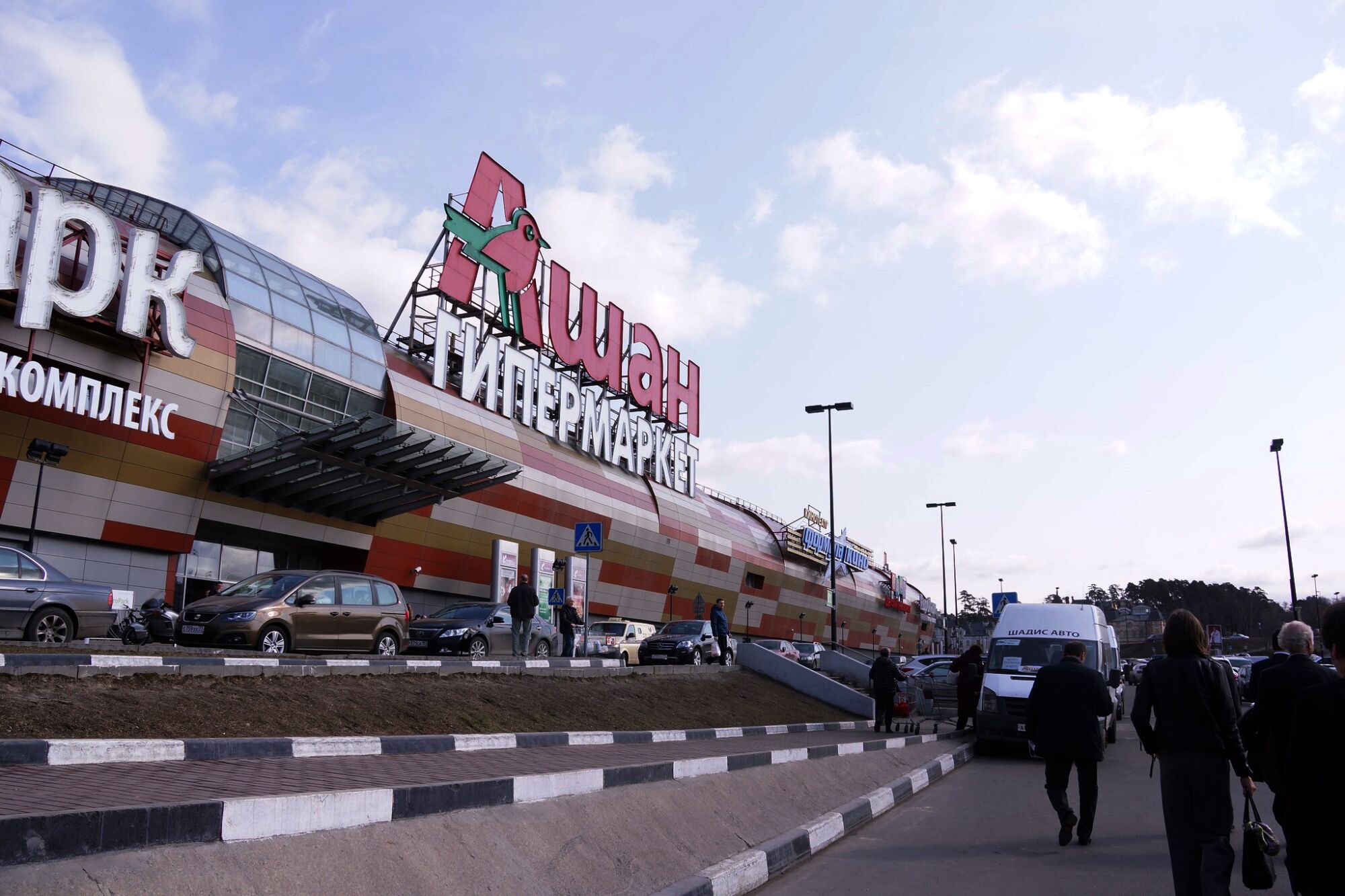
The Europark mall in 2014. Vitaly Smagin secured an $84-million judgment against Ashot Yegiazaryan after he lost his financial interest in the mall.
(Friedrich Ludewig / For The Times)
Amid the years-long litigation, Luzhkov and Real died, and a new U.S. District Court judge, Gary Klausner, was appointed. In Russia, Yegiazaryan and his brother were found guilty in absentia of defrauding Smagin and in 2018 sentenced to serve their terms in penal colonies.
Additional lawsuits were filed in Los Angeles, where Yegiazaryan was held in contempt by Klausner in 2020 for violating a court order not to interfere with the trust. Yegiazaryan accrued more than $1.5 million in unpaid court fines.
Yet, by 2020, the award was still sitting in the Monaco bank, faced with conflicting orders over how to disburse the money. That year, Smagin’s attorneys filed the RICO case in Los Angeles, alleging a broad conspiracy led by Yegiazaryan to defraud him and deny him what he is owed.
“Defendant Ashot Yegiazaryan is a Russian criminal on the Interpol ‘Red’ list, living amongst us in a luxury estate in Beverly Hills as a citizen of California. From Beverly Hills, Mr. Yegiazaryan lords over a criminal empire worth hundreds of millions of dollars; his stock in trade is real estate fraud,” states the complaint’s opening sentence.
Among the other defendants, aside from family members, were the Monaco bank and business associates with connections to the trust.
Klausner threw out the case, ruling the law didn’t apply because Smagin was a Russian citizen and the dispute was essentially foreign in nature. However, he was overruled on appeal, leading to the Supreme Court review.
At an April 25 hearing before the court, Kennedy, Smagin’s attorney, made sure to assert that Yegiazaryan was an “international fugitive” who should be in a Russian prison.
The high court, in a 6-3 decision written by Justice Sonia Sotomayor and joined by Chief Justice John G. Roberts Jr., ruled that the lawsuit could proceed despite Smagin’s citizenship. It noted Yegiazaryan was a California resident, the award had been recognized in a California judgment and the case involved an alleged conspiracy, much of which took place in the U.S.
Justice Samuel A. Alito Jr., in a dissenting opinion, expressed concern about giving a foreign litigant access to the powerful RICO statute and said the history of the dispute might be relevant, among other context.
The case was sent back to Klausner, who will now consider it on its merits. It could drag out for a year or more given the complexity of the disputed facts.
“So this decision is really just saying, ‘Look, the gates aren’t closed at the outset. You can at least make a case to the [lower] court. Whether or not you succeed is another matter,’” said Maggie Gardner, a professor of international law at Cornell Law School.
Kennedy continued to press for the Kerimov funds through the ongoing federal court case in Los Angeles. That prompted Klausner last month to threaten to incarcerate Yegiazaryan if he didn’t take steps to free up the trust money.
At a hearing this month, the former Duma legislator agreed to do so and Klausner lifted the contempt order, though it’s unclear when Smagin might receive any money.
Last man standing
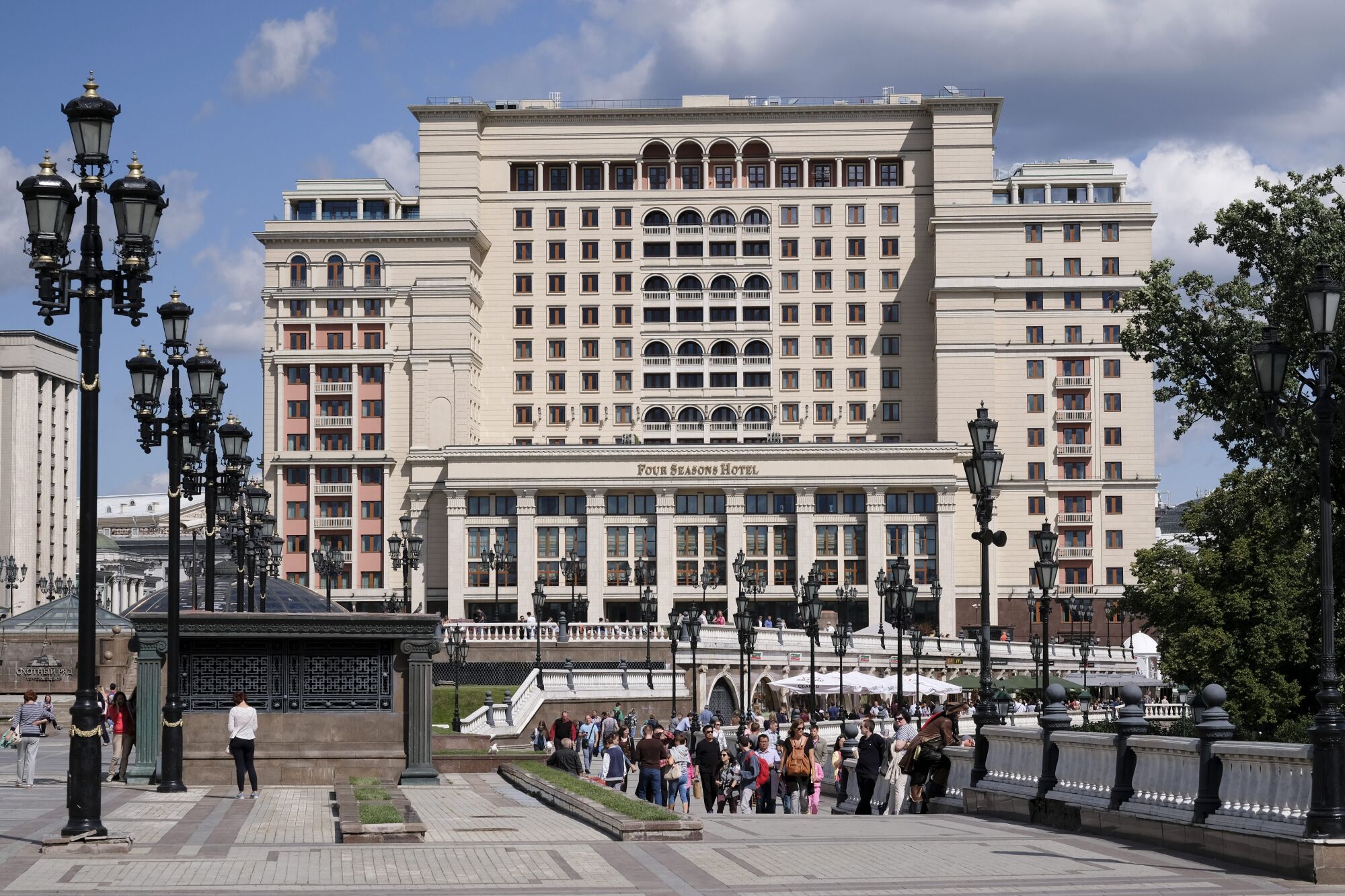
People walk outside the Four Seasons Hotel, formerly the Hotel Moskva, in downtown Moscow in 2016.
(Alexander Zemlianichenko / Associated Press)
If you read enough about all the expatriates who have left Russia during Putin’s increasingly dictatorial reign, you’re bound to run up against someone who’s described as “not a saint” — yet didn’t deserve what they got.
The same might be said about Yegiazaryan.
Richard Hainsworth, a former banking analyst in Moscow, said that Yegiazaryan may not have been a “paragon of virtue” but there was a “spectrum” of businesspeople who ran banks in the 1990s.
“What has happened since Putin’s third term is that the truly evil businessmen have eliminated everyone else with any scruples,” he said, speaking broadly.
Aslund called Yegiazaryan a political “opportunist” with shifting alliances who didn’t know when to fold when it became clear the Kremlin wanted him out of the hotel project. “He just wouldn’t play the game with the Hotel Moskva. When the chips are down you have to realize it and he did not,” said the former diplomat.
Yet if Yegiazaryan’s stubbornness was his undoing, it’s also the reason that a decade later Smagin hasn’t gotten a penny of his judgment.
“You know who wins a war?” Yegiazaryan said in the spring. “The one who lasts one minute longer.”
Yegiazaryan once lived large in a Moscow mansion now occupied by his former wife, with a Lear jet at his disposal.
These days, his Beverly Hills redoubt is in disrepair, while an expired Russian passport and fear of possible arrest prevent him from traveling internationally. Instead, he takes pleasure in his close friends and family. He has two daughters with his current partner, and on the lock screen of his iPhone is a photo of his grandson.
And he takes heart that the Ukraine war has united the world against Putin, the ultimate author, he believes, of all his difficulties, past and present.
“I’m still alive,” he said.

Business
Elon Musk, Mark Zuckerberg and Jeff Bezos to Attend Trump’s Inauguration

Bezos, Zuckerberg and Coke at the inauguration
Corporate America had already raced to donate big sums to Donald Trump’s record-breaking inaugural fund. Now some of its leaders appear eager to jockey for prominent positions at the inauguration next week.
It’s a new reminder that for some of the nation’s biggest businesses, forging close ties to a president-elect who is promising hard-hitting policies like tariffs is a priority this time around.
Jeff Bezos and Mark Zuckerberg are expected to be on the inauguration dais, according to NBC News, alongside Elon Musk and several cabinet picks.
The presence of Musk isn’t a surprise, given the Tesla chief’s significant support of and huge influence over Trump. But the other tech moguls have only more recently been seen as supporters of the administration. (Indeed, Bezos frequently sparred with Trump during his first presidential term.)
It’s the latest effort by Bezos and Zuckerberg to burnish their Trump credentials. At the DealBook Summit in December, Bezos — whose Amazon has faced scrutiny under the Biden administration and whose Blue Origin is hoping to win government rocket contracts — said that he was “very hopeful” about Trump’s efforts to reduce regulation.
And Zuckerberg recently announced significant changes to Meta’s content moderation policy, including relaxing restrictions on speech seen as protecting groups including L.G.B.T.Q. people that won praise from Trump and other conservatives. On the inauguration front, Zuckerberg is also co-hosting a reception alongside the longtime Trump backers Miriam Adelson, Tilman Fertitta and Todd Ricketts.
Both tech moguls have visited Mar-a-Lago since the election, with Zuckerberg having done so more than once.
Coca-Cola took a different tack. The drinks giant’s C.E.O., James Quincey, gave Trump what an aide called the “first ever Presidential Commemorative Inaugural Diet Coke bottle.”
More broadly, business leaders want a piece of the inauguration action. The Times previously reported that the Trump inaugural fund had surpassed $170 million, a record, and that even major donors have been wait-listed for events.
Others are throwing unofficial events around Washington, including an “Inaugural Crypto Ball” that will feature Snoop Dogg, with tickets starting at $5,000, The Wall Street Journal reports.
It’s a reminder that C.E.O.s are reading the room, and preparing their companies for a president who has proposed creating an “External Revenue Service” to oversee what he has promised will be wide-ranging tariffs.
David Urban, a longtime Trump adviser who’s hosting a pre-inauguration event, told The Journal, “This is the world order, and if we’re going to succeed, we need to get with the world order.”
-
In other Trump news: The president-elect is expected to appear via videoconference at the World Economic Forum in Davos, Switzerland, which starts on Inauguration Day, according to Semafor.
HERE’S WHAT’S HAPPENING
Investors brace for the latest inflation data. The Consumer Price Index report, due out at 8:30 a.m. Eastern, is expected to show that inflation ticked up last month, most likely because of climbing food and fuel costs. Global bond markets have been rattled as slow progress on slowing inflation has prompted the Fed to slash its forecast for interest rate cuts.
More Trump cabinet picks will appear before the Senate on Wednesday. Senator Marco Rubio of Florida, the choice for secretary of state, is expected to field questions about his views on the Middle East, Ukraine and China, but is expected to be confirmed. Russell Vought, the pick to run the Office of Management and Budget, will most likely be asked about his advocacy for drastically shrinking the federal government, a key Trump objective. And Sean Duffy, the Fox Business host chosen to lead the Transportation Department, will probably face questions on how he would oversee matters including aviation safety and autonomous vehicles, the latter of which is a priority for Elon Musk.
Meta plans to lay off another 5 percent of its employees. Mark Zuckerberg, the tech giant’s C.E.O., told staff members to prepare for “extensive performance-based cuts” as the company braces for “an intense year.” The social media giant faces intense competition in the race to commercialize artificial intelligence.
A new bill would give TikTok a reprieve from a ban in the United States. Senator Ed Markey, Democrat of Massachusetts, said he planned to introduce the Extend the TikTok Deadline Act, which would give the video platform 270 additional days to be divested from its Chinese parent, ByteDance before being blacklisted. It’s the latest effort to buy TikTok time, as the app faces a Jan. 19 deadline set by a law; President-elect Donald Trump has opposed the potential ban as well.
A question of succession
JPMorgan Chase and BlackRock, the giant money manager, just reported earnings. (In short: Both handily beat analyst expectations.)
But the Wall Street giants are likely to face questioning on a particular issue on Wednesday: Which top lieutenants are in line to replace their larger-than-life C.E.O.s, Jamie Dimon and Larry Fink.
Who’s out:
-
Daniel Pinto, who had long been Dimon’s right-hand man, said he would officially drop his responsibilities as JPMorgan’s C.O.O. in June and retire at the end of 2026. Jenn Piepszak, the co-C.E.O. of the company’s core commercial and investment bank, has become C.O.O.
-
And Mark Wiedman, the head of BlackRock’s global client business and a top contender to succeed Fink, is planning to leave, according to news reports.
What Wall Street is gossiping about JPMorgan: Even in taking the C.O.O. role, JPMorgan said that Piepszak wasn’t interested in succeeding Dimon “at this time.” DealBook hears that while she genuinely appears not to want to pursue the top job, the phrasing covers her in case she changes her mind.
For now, that means the most likely candidates for the top spot are Marianne Lake, the company’s head of consumer and community banking; Troy Rohrbaugh, the other co-head of the commercial and investment bank; and Doug Petno, a co-head of global banking.
The buzz around BlackRock: Wiedman reportedly didn’t want to keep waiting to succeed Fink and is expected to seek a C.E.O. position elsewhere. (So sudden was his departure that he’s forfeiting about $8 million worth of stock options and, according to The Wall Street Journal, he doesn’t have another job lined up yet.)
Fink said on CNBC on Wednesday that Wiedman’s departure had been in the works for some time, with the executive having expressed a desire to leave about six months ago.
Other candidates to take over for Fink include Martin Small, BlackRock’s C.F.O.; Rob Goldstein, the firm’s C.O.O.; and Rachel Lord, the head of international.
But Dimon and Fink aren’t going anywhere just yet. Dimon, 68, said only last year that he might not be in the role in five years. And Fink, 72, said in July that he was working on succession planning: “When I do believe the next generation is ready, I’m out.”
The S.E.C. gets in a final shot at Musk
Another battle between Elon Musk and the S.E.C. erupted on Tuesday, with the agency suing the tech mogul over his 2022 purchase of Twitter.
It’s unclear what happens to the lawsuit once President-elect Donald Trump, who counts Musk as a close ally, takes office. But the agency’s reputation as an independent watchdog may be at stake.
A recap: The S.E.C. accused Musk of violating securities laws in his $44 billion acquisition of the social media company.
The agency said that Musk had failed to disclose his Twitter ownership stake for a pivotal 11-day stretch before revealing his intentions to purchase the company. That breach allowed him to buy up at least $150 million worth of Twitter shares at a lower price — to the detriment of existing shareholders, the agency argues.
The S.E.C. isn’t just seeking to fine Musk. It wants him to pay back the windfall. “That’s unusual,” Ann Lipton, a professor at Tulane Law School, told DealBook.
Alex Spiro, Musk’s lawyer, called the latest action a “sham” and accused the agency of waging a “multiyear campaign of harassment” against him.
The showdown sets up a tough question for the S.E.C. Will Paul Atkins, the president-elect’s widely respected pick to lead the agency, drop the case? Such a move could call the bedrock principle of S.E.C. independence into question.
Jay Clayton, who led the agency during Trump’s first term, earned the respect of the business community for running it in a largely drama-free manner. It was under Clayton that the S.E.C. sued Musk over his statements about taking Tesla private.
Musk, who is set to become Trump’s cost-cutting czar and is expected to have office space in the White House complex, has called for the “comprehensive overhaul” of agencies like the S.E.C. The billionaire said he would also like to see “punitive action against those individuals who have abused their regulatory power for personal and political gain.”
-
In related news: The Consumer Financial Protection Bureau sued Capital One, accusing it of cheating its depositors out of $2 billion in interest payments.
THE SPEED READ
Deals
-
DAZN, the streaming network backed by the billionaire businessman Len Blavatnik, is closing in on funding from Saudi Arabia’s sovereign wealth fund as the kingdom continues to expand its sports footprint. (NYT)
-
The Justice Department sued KKR, accusing the investment giant of withholding information during government reviews for several of its deals. KKR filed a countersuit. (Bloomberg)
-
OpenAI added Adebayo Ogunlesi, the billionaire co-founder of the infrastructure investment firm Global Infrastructure Partners, to its board. (FT)
Politics and policy
Best of the rest
We’d like your feedback! Please email thoughts and suggestions to dealbook@nytimes.com.
Business
For uninsured fire victims, the Small Business Administration offers a rare lifeline
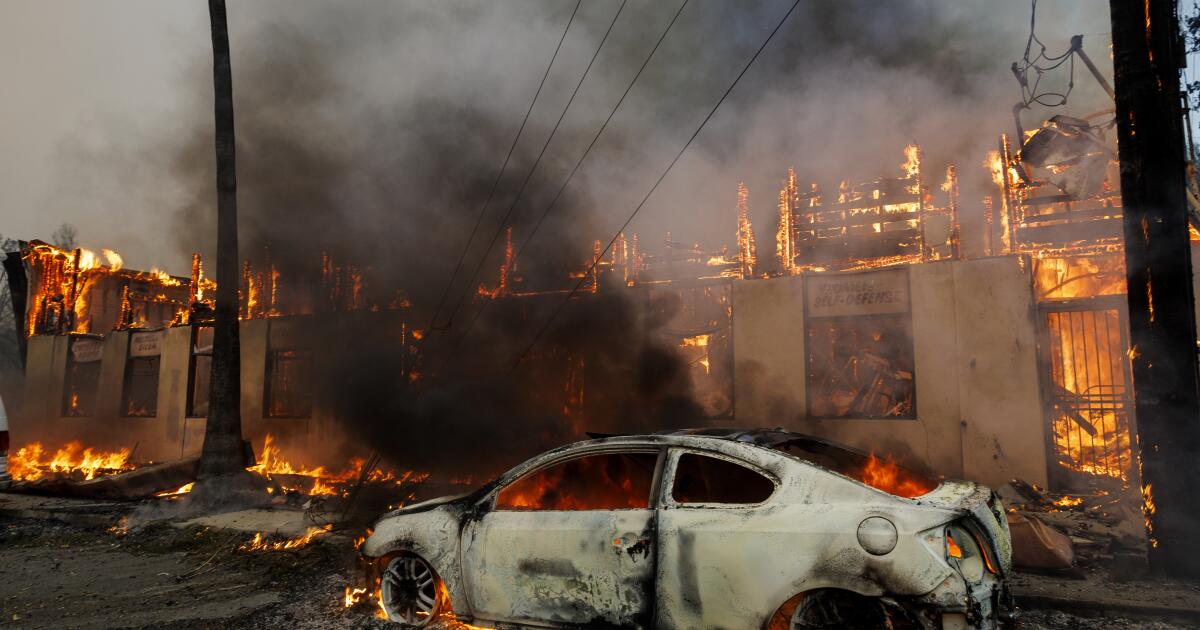
As wildfires continue to burn around Southern California, thousands of business owners, homeowners and renters are confronting the daunting challenge of rebuilding from the ashes. For some number of them, the road ahead will be all the more difficult because they didn’t have any or enough insurance to cover their losses. For them, the U.S. Small Business Administration is a possible lifeline.
The SBA, which offers emergency loans to businesses, homeowners, renters and nonprofits, is among the few relief options for those who don’t have insurance or are underinsured. Uninsured Angelenos can also apply for disaster assistance through the Federal Emergency Management Agency, or FEMA.
The current wildfires are ravaging a state that was already in the midst of a home insurance crisis. Thousands of homeowners have lost their insurance in recent years as providers pull out of fire-prone areas and jack up their prices in the face of rising risk.
“For those who are not going to get that insurance payout, this is available,” Small Business Administration head Isabella Casillas Guzman said in an interview during a recent trip to the fire areas. “The loans are intended to fill gaps, and that is very broad.”
About one-third of businesses don’t have insurance and three-quarters are underinsured, Guzman said.
“There will be residual effects around the whole community,” she said. “Insurance will not cover this disaster.”
Businesses, nonprofits and small agricultural cooperatives can apply for an economic injury loan or a physical damage loan through SBA. Homeowners are eligible for physical damage loans. Economic injury loans are intended to help businesses meet ordinary financial demands, while physical damage loans provide funds for repairs and restoration. People can apply online and loans must be repaid within 30 years.
Renters can receive up to $100,000 in assistance, homeowners up to $500,000 and businesses up to $2 million, according to Guzman. Homeowners and renters who cannot get access to credit elsewhere can qualify for loans with a interest rate of 2.5%. The SBA determines an applicant has no credit available elsewhere if they do not have other funds to pay for disaster recovery and cannot borrow from nongovernment sources.
Interest rates for homeowners and renters who do have access to credit elsewhere are just over 5%. Loans for businesses could come with interest rates of 4% or 8% depending on whether the business has other credit options.
An applicant must show they are able to repay their loan and have a credit history acceptable to the SBA in order to be approved. The loans became available following President Biden’s declaration of a major disaster in California.
“We’ve already received hundreds of applications from individuals and businesses interested in exploring additional support,” Guzman said. “We know the economic disruption may not be contained to the footprint of any evacuation zones or power outages.”
People who don’t have insurance or whose insurance doesn’t cover the entirety of their losses are eligible for loans, Guzman said. While many will use the funds to start from scratch after losing their property to the fires, businesses that are still standing can also apply for support to cover lost revenue.
Guzman was not able to estimate the total value of loans they expect to offer in California but said the organization is on solid financial footing after temporarily running out of funds in October.
“Funding has been replenished by Congress, and we expect to be able to coordinate closely with Congress,” Guzman said. “We’re fully funded and in a good position to provide support.”
Business
Cookies, Cocktails and Mushrooms on the Menu as Justices Hear Bank Fraud Case

In a lively Supreme Court argument on Tuesday that included references to cookies, cocktails and toxic mushrooms, the justices tried to find the line between misleading statements and outright lies in the case of a Chicago politician convicted of making false statements to bank regulators.
The case concerned Patrick Daley Thompson, a former Chicago alderman who is the grandson of one former mayor, Richard J. Daley, and the nephew of another, Richard M. Daley. He conceded that he had misled the regulators but said his statements fell short of the outright falsehoods he said were required to make them criminal.
The justices peppered the lawyers with colorful questions that tried to tease out the difference between false and misleading statements.
Chief Justice John G. Roberts Jr. asked whether a motorist pulled over on suspicion of driving while impaired said something false by stating that he had had one cocktail while omitting that he had also drunk four glasses of wine.
Caroline A. Flynn, a lawyer for the federal government, said that a jury could find the statement to be false because “the officer was asking for a complete account of how much the person had had to drink.”
Justice Ketanji Brown Jackson asked about a child who admitted to eating three cookies when she had consumed 10.
Ms. Flynn said context mattered.
“If the mom had said, ‘Did you eat all the cookies,’ or ‘how many cookies did you eat,’ and the child says, ‘I ate three cookies’ when she ate 10, that’s a false statement,” Ms. Flynn said. “But, if the mom says, ‘Did you eat any cookies,’ and the child says three, that’s not an understatement in response to a specific numerical inquiry.”
Justice Sonia Sotomayor asked whether it was false to label toxic mushrooms as “a hundred percent natural.” Ms. Flynn did not give a direct response.
The case before the court, Thompson v. United States, No. 23-1095, started when Mr. Thompson took out three loans from Washington Federal Bank for Savings between 2011 and 2014. He used the first, for $110,000, to finance a law firm. He used the next loan, for $20,000, to pay a tax bill. He used the third, for $89,000, to repay a debt to another bank.
He made a single payment on the loans, for $390 in 2012. The bank, which did not press him for further payments, went under in 2017.
When the Federal Deposit Insurance Corporation and a loan servicer it had hired sought repayment of the loans plus interest, amounting to about $270,000, Mr. Thompson told them he had borrowed $110,000, which was true in a narrow sense but incomplete.
After negotiations, Mr. Thompson in 2018 paid back the principal but not the interest. More than two years later, federal prosecutors charged him with violating a law making it a crime to give “any false statement or report” to influence the F.D.I.C.
He was convicted and ordered to repay the interest, amounting to about $50,000. He served four months in prison.
Chris C. Gair, a lawyer for Mr. Thompson, said his client’s statements were accurate in context, an assertion that met with skepticism. Justice Elena Kagan noted that the jury had found the statements were false and that a ruling in Mr. Thompson’s favor would require a court to rule that no reasonable juror could have come to that conclusion.
Justices Neil M. Gorsuch and Brett M. Kavanaugh said that issue was not before the court, which had agreed to decide the legal question of whether the federal law, as a general matter, covered misleading statements. Lower courts, they said, could decide whether Mr. Thompson had been properly convicted.
Justice Samuel A. Alito Jr. asked for an example of a misleading statement that was not false. Mr. Gair, who was presenting his first Supreme Court argument, responded by talking about himself.
“If I go back and change my website and say ‘40 years of litigation experience’ and then in bold caps say ‘Supreme Court advocate,’” he said, “that would be, after today, a true statement. It would be misleading to anybody who was thinking about whether to hire me.”
Justice Alito said such a statement was, at most, mildly misleading. But Justice Kagan was impressed.
“Well, it is, though, the humblest answer I’ve ever heard from the Supreme Court podium,” she said, to laughter. “So good show on that one.”
-

 Health1 week ago
Health1 week agoOzempic ‘microdosing’ is the new weight-loss trend: Should you try it?
-
/cdn.vox-cdn.com/uploads/chorus_asset/file/25822586/STK169_ZUCKERBERG_MAGA_STKS491_CVIRGINIA_A.jpg)
/cdn.vox-cdn.com/uploads/chorus_asset/file/25822586/STK169_ZUCKERBERG_MAGA_STKS491_CVIRGINIA_A.jpg) Technology6 days ago
Technology6 days agoMeta is highlighting a splintering global approach to online speech
-

 Science4 days ago
Science4 days agoMetro will offer free rides in L.A. through Sunday due to fires
-
/cdn.vox-cdn.com/uploads/chorus_asset/file/25821992/videoframe_720397.png)
/cdn.vox-cdn.com/uploads/chorus_asset/file/25821992/videoframe_720397.png) Technology1 week ago
Technology1 week agoLas Vegas police release ChatGPT logs from the suspect in the Cybertruck explosion
-

 Movie Reviews1 week ago
Movie Reviews1 week ago‘How to Make Millions Before Grandma Dies’ Review: Thai Oscar Entry Is a Disarmingly Sentimental Tear-Jerker
-

 Health1 week ago
Health1 week agoMichael J. Fox honored with Presidential Medal of Freedom for Parkinson’s research efforts
-

 Movie Reviews1 week ago
Movie Reviews1 week agoMovie Review: Millennials try to buy-in or opt-out of the “American Meltdown”
-

 News1 week ago
News1 week agoPhotos: Pacific Palisades Wildfire Engulfs Homes in an L.A. Neighborhood













